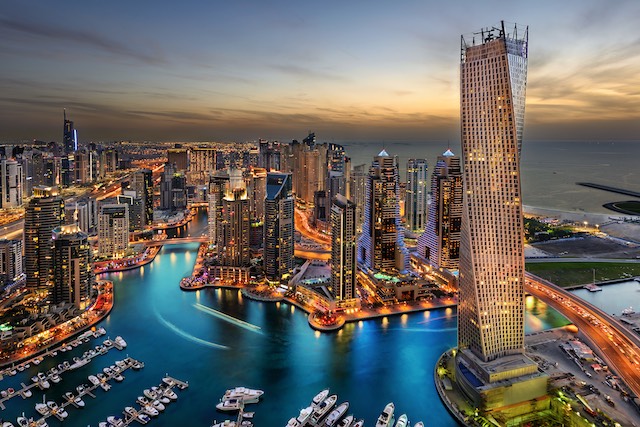Working in Dubai: Discover what it's really like

Expatriates seeking to work in the Middle East are often drawn to Dubai, the cosmopolitan city that blends ultra-modern urban living with centuries of tradition and culture. For professionals, it offers a wealth of opportunity, perfect for those with the ambition and drive to forge a successful international career.
There are clear advantages to relocating to the United Arab Emirates over other popular Middle Eastern expat destinations. The potential for high wages and salary growth is very good. For those moving from London, the option to replace higher-band taxes and rainy days with favourable income tax laws and year-round sunshine is certainly appealing.
While Dubai, and the United Arab Emirates, might not be getting quite the influx of foreign nationals it once did, it still remains a popular choice among expats, particularly those who work within the finance and banking, technology and science, and construction and shipping industries.
Work opportunities in Dubai
The United Arab Emirates ranks the 9th best country for British expatriates in the HSBC Expat Explorer Survey 2019. The areas where it ranks particularly high are all centred around an expat’s working life – income, disposable income, career progression and reaching potential all score exceptionally highly. Work/life balance is also considered good, though the experience can sometimes be less favourable for families who emigrate with a working partner.
Finding a job in the UAE is the first step, but the majority of professional expatriates are relocated within their own multinational corporations or headhunted through their current roles. However, if you wish to move to Dubai and don’t yet have a job offer, there are plenty of opportunities to be proactive and network within relevant industries and through recruitment agencies without leaving British soil. You will need to secure a position before relocation, but there are often short-term contracts available that enable you to get to know the country while also searching for a more long-term position.
It is worth bearing in mind that it can be very much an employer’s market, according to one article on the BBC’s Worklife website. Not only that, due to pressures on the economy and falling oil prices, a commodity that the UAE relies on, the exceptionally high-salaried jobs are less prevalent and there is more competition at the professional end of the job scale.
However, there are still plenty of valuable opportunities, according to Hays 2019 GCC Salary & Employment Report for the UAE. The annual report, which surveys over 2,000 employers and employees in the region, gives a good indication of salary and hiring trends. For 2019, they are on the up, which signals a recovering economy and a rich market for British expatriates. The report showed that 42% of professional salaries increased year on year in 2018, almost half (49%) stayed the same and 9% decreased. With 62% of employers expecting salaries to increase in the next year, and 67% expecting to recruit additional staff in the same time period, there remains plenty of confidence in key industries.
Business culture in Dubai
Working in Dubai can be different in many ways to working in London or another Western capital. For those working in the Middle East directly for the first time, it’s worth brushing up on business etiquette and culture to help form good relations with local clients.
There is rarely a language barrier, given that most business is conducted in English. However, as the official language is Arabic, documentation and presentations should be supplied in both languages. It is also advisable to get business cards printed to reflect both Arabic and English languages.
It is normal to dress in a smart, conservative manner. While it can get very hot in Dubai, which can certainly take some adjusting to when coming from a cooler Western climate, you will still be expected to wear full business attire. Women should be aware of cultural norms when it comes to clothing; Dubai may be more liberal than other cities in the UAE, but it is still an Arabic country with Islamic law. It is expected to cover shoulders, arms and legs as much as possible, and stick to looser cuts.
You should be mindful of Arabic clients who observe the Islamic faith. This might mean ensuring that meetings are scheduled outside of routine prayer times, and that considerations are made during the Ramadan period. Working hours are often adapted during this month in respect of those who are fasting.
If you are hosting a meeting with a client, ensure that you provide some refreshment, which is expected in the local culture. Being a good host is considered an essential skill, even when doing formal business. You should also ensure that you are punctual for all meetings, and that you spend some time with your clients getting to know them on a more personal level before starting to talk business. Building a good relationship is all part of the business environment.
Hierarchy in business is formally observed too. You should ensure that you greet your clients or business partners based on seniority. Be aware that some professionals may not wish to shake hands with someone of the opposite sex, but other formal greetings are generally accepted, such as a gesture or nod of the head. Follow the cues of others in the room and the person you are greeting while you navigate the cultural landscape when you first start working in the Middle East. If you do shake hands, you should use your right hand.
For those with the right skills and the ability to adapt to a new working environment, Dubai still has plenty to offer. If you’re moving to Dubai with work, contact us today for your free survey and quote to ship your belongings internationally with Cadogan Tate.



